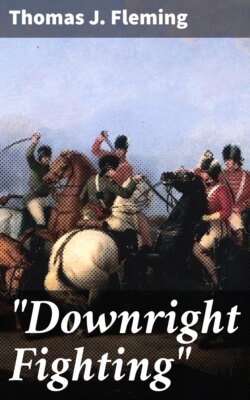Читать книгу "Downright Fighting" - Thomas J. Fleming - Страница 4
На сайте Литреса книга снята с продажи.
1
ОглавлениеTable of Contents
All night the two men rode northwest along the muddy winding roads of South Carolina’s back country. Twice they had to endure bone-chilling swims across swollen creeks. Now, in the raw gray cold of dawn, they faced a more formidable obstacle—the wide, swift Pacolet River. They rode along it until they found the ford known as Grindal Shoals. Ordinarily, it would have been easy to cross. But the river was high. The icy water lapped at their thighs as the weary horses struggled to keep their feet in the rushing current. “Halt,” snarled a voice from the river bank. “Who goes there?”
“Friend,” said the lead rider, 25-year-old Joseph McJunkin.
The sentry barked the password for the night. McJunkin and his companion, James Park, did not know the countersign. McJunkin told the sentry he had an important message for General Morgan. The sentry told him not to move or he would put a hole through his chest. He called for the captain of the guard. The two riders had to sit there in the icy river while the captain made his way to the bank. Once more McJunkin insisted he had a message for General Morgan. It was from Colonel Pickens. It was very important.
The captain invited the two men onto the north bank of the Pacolet. Above them, on a wooded hill, was the camp of Brig. Gen. Daniel Morgan of the Continental Army of the United States. Around Morgan’s tent, about 830 men were lighting fires and beginning to cook their breakfasts, which consisted largely of cornmeal. From a barrel in a wagon, a commissary issued a gill (four ounces) of rum. Most added water to it and put it in their canteens. A few gulped the fiery liquid straight, in spite of the frowns of their officers. Some 320 of the men still wore pieces of uniforms—a tattered blue coat here, a ragged white wool waistcoat there, patched buff breeches. In spite of the rainy, cold January weather, few had shoes on their feet. These men were Continentals—the names by which patriot regular army soldiers, usually enlisted for three years, were known.
The rest of the army wore a varied assortment of civilian clothing. Hunting shirts of coarse homespun material known as linsey-woolsey, tightly belted, or loose wool coats, also homespun, leather leggings, wool breeches. These men were militia—summoned from their homes to serve as emergency soldiers for short periods of time. Most were from western districts of the Carolinas. About 120 were riflemen from Virginia, committed to serving for six months. Most of these were former Continentals. They were being paid by other Virginians who hired them as substitutes to avoid being drafted into the army. After five years of war, patriotism was far from universal in America.
In his tent, Morgan listened to the message McJunkin brought from Col. Andrew Pickens: the British were advancing in force. Morgan whirled and roused from a nearby camp cot a small groggy man who had managed to sleep through McJunkin’s bad news. His name was Baron de Glaubech. He was one of the many French volunteers who were serving with the Americans. “Baron,” Morgan said. “Get up. Go back and tell Billy that Benny is coming and he must meet me tomorrow evening at Gentleman Thompson’s on the east side of Thicketty Creek.”
Sixty-three years later, when he was 80, Joseph McJunkin remembered these words with their remarkable combination of informality and decision. It was part of the reason men like young McJunkin trusted Daniel Morgan. It was somehow reassuring to hear him call Lt. Col. William Washington, commander of the American cavalry and second cousin to Gen. George Washington, “Billy.” It was even more reassuring to hear him call Lt. Col. Banastre Tarleton, commander of the British army that was coming after them, “Benny.”
Adding to this reassurance was 45-year-old Daniel Morgan’s appearance and reputation. He was over six feet tall, with massive shoulders and arms, toughened from his youthful years as a wagonmaster in western Virginia. In his younger days he had been one of the champion sluggers and wrestlers of the Shenandoah Valley. His wide volatile face could still flash from cheerfulness to pugnacity in an instant. In the five years of the Revolution, Morgan had become a living legend: the man who led a reckless assault into the very mouths of British cannon on the barricaded streets of Quebec in 1775, whose corps of some 570 riflemen had been the cutting edge of the American army that defeated the British at Saratoga in 1777.
The victor at Saratoga, Gen. Horatio Gates (top) came south in July 1780 to command the Southern Department after the main Continental army in the South was surrendered at Charleston. Charles Willson Peale shows Gates at 49 with an open face and a steady gaze.
A month later he himself was routed at Camden by Cornwallis. Cornwallis was only 45, two years after Yorktown, when he sat for Gainsborough. Both generals are portrayed in their prime.
